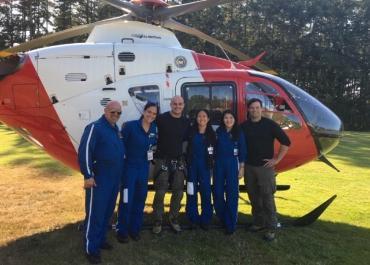Transporting Life: Being a Flight Nurse During COVID-19
Posted by The Seattle University Alumni Association on Wednesday, June 3, 2020 at 1:05 PM PDT

Flight nurses provide emergency care around the clock. These healthcare professionals work closely with first responders to transport critical patients. In the WAMI region, Airlift Northwest, an entity of UW Medicine transports patients from accidents and remote locations to Seattle in order to receive definitive care.
Nicole Hardie, ‘98 has been a pediatric flight nurse for Airlift Northwest for the past 13 years. “We will continue to go anywhere and get anyone, but COVID- 19 has impacted how I do my job, including how I protect myself and how I protect the next patient that I care for,” says Hardie.
Due to how the virus spreads, Airlift Northwest has developed a transport protocol that is designed to keep patients and caregivers safe. “We triage all patients into green, yellow and red categories. A green patient has no symptoms, no sick contacts and no breathing tube. A yellow patient who has symptoms or a breathing tube is treated as a potential positive coronavirus case because of how the virus spreads. And finally, a red patient is a known COVID-positive patient.”
Based on the triage category indicated by first responders and referring hospitals, flight nurses will put on the appropriate PPE (personal protective equipment) and start the transport. Since the start of the pandemic, Airlift Northwest has transported 50 red patients and 350 yellow patients.
What used to take two hours now takes three to four hours due to the amount of cleaning and disinfecting required for each transport. “We take everything out of the helicopter, disinfect every single piece of equipment and the helicopter and then disinfect ourselves,” said Hardie. Her team may get notified that another patient is ready during this process, but the crew must continue to follow this detailed protocol in order to minimize any chance of exposure to COVID-19 for themselves and for the next patient. In one 24-hour shift, she may participate in as many as eight transport flights.
Nurses play a vital role in healthcare. They are patient champions who take the whole person into consideration. “I see people on their worst day, and I am really cognizant and aware of trying to meet people in that space. The nursing program at Seattle University taught me cura personalis-to care for the whole person. It is about the medicine, the breathing treatment and drugs for pain, but it is also about being there for them and their family in that moment.”
As Washington starts to ease restrictions and as we head into the summer, Hardie knows that transports will pick up. “We are heading into our peak season as people head outdoors. What we are currently seeing is smaller cities that didn’t have any infections are now experiencing an increase in COVID-19 cases. We are expecting the number of patients that need transport to increase.”
Hardie notes that people around the world are dealing with a health pandemic that is unknown and indiscriminate, but she sees this as a time to come together and learn together, rather than to grow apart. “We need to respect where people are in this whole process. Support each other. Educate yourself. And if you are at all feeling under the weather, stay home.”
Find out more about Airlift Northwest and their role in healthcare in Washington, Alaska, Montana and Idaho.
